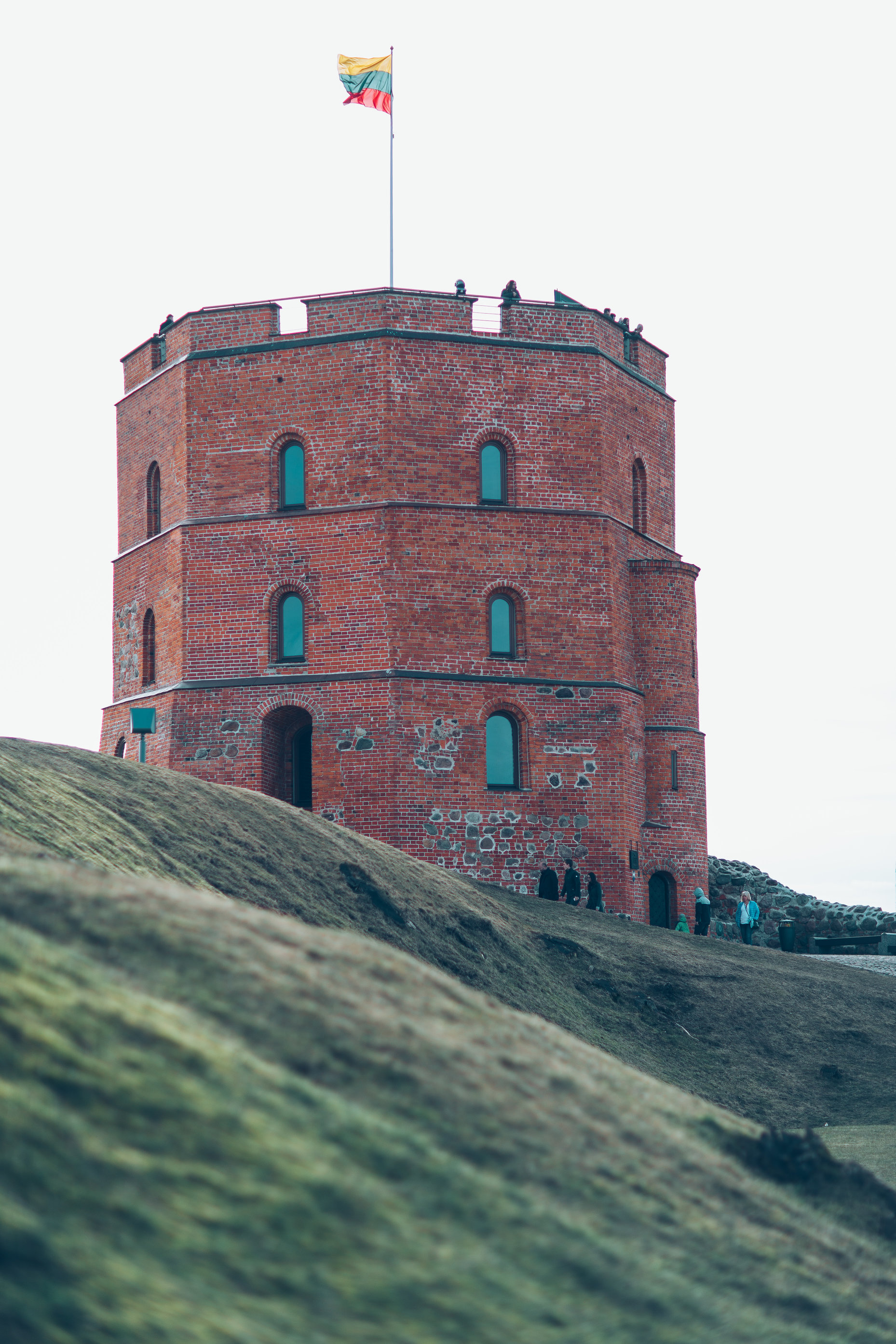Sundays are meant to be lazy and slow or spent outdoors, period. Due to its rich cultural heritage, quirky neighbourhoods, charming alleyways and green spaces, Vilnius is a great city for wandering about. Walking allows you to thoroughly take in parts of the city that can be easily overlooked otherwise.

My suggested route takes you past iconic landmarks of Vilnius and reveals some of the history behind them. Epic views are included on the itinerary as some of the stops are located at the highest points of the city. Make sure to bring your walking shoes and a camera, because you’re going to want to capture the beauty of Vilnius.
Duration: 1.5 – 2 hours
Price: 2,5 – 11,5 Euro
Gediminas Tower
Start your stroll with a decent dose of cardio and head up to Gediminas’ tower which, for many, is crowned as the most popular attraction in Vilnius. As the legend goes, Gediminas, the Duke of Lithuania, decided to build a castle when he had a prophetic dream. And so he did.
After numerous wars throughout history, it’s the only remaining part of the castle. The red-brick tower invites you to an indoor exhibition as well as to admire the scenic view of the city from the observation deck.
University’s St. Johns’ Church Bell Tower
This time you won’t have to do the walking all the way to the top. The second landmark, St. Johns’ Tower, has a lift that takes you up there.
From its deck, you can get a view overlooking the old town and backyards of the University like nowhere else as it is the highest building in the historic part of Vilnius.
Bear in mind that there’s an entrance fee and the tower is only open from April to August.
Literatai Street
The third stop on your route is more like a passing to reach St. Anne’s Church. Nonetheless, the charming street is definitely worth stopping by.
In Lithuanian, it is called Literatų gatvė, and is decorated with art dedicated to prominent authors in Lithuanian literature. It’s not street art per se, but more like miniature masterpieces made from glass, metal, wood or ceramic installed on the side of the wall, and every single one of them was created in honour of a famous individual.
St. Anne’s Church
If you’re a local, most likely you’ve heard a story about Napoléon Bonaparte wanting to take the Church of St. Anne’s with him because of its splendour.
Even though that’s only a legend, the building remains a frequently visited attraction and not without reason. The church is one of the most elaborate gothic buildings in Lithuania that has withstood over 500 years, including wars and occupations.
Subačius Viewpoint
On Monday you can boast about how many calories you’ve burnt because to reach Subačius street you’ll have to walk for a bit over a kilometre along Maironis street and then up the hillside.
When you reach the top of it, you’ll find a vantage point with stellar views of Vilnius. Engraved on a sculpted metal plate, you can find the names of the buildings that can be seen from there.
Do you feel like you could use a coffee break? Conveniently, there’s a cafe where you can order a dose of caffeine and be dazzled by the cityscape, which looks fantastic if you make it on time for the sunrise or sunset.
The Bastion of Vilnius City Wall
As you’re approaching the end of the stroll, you’ll be heading towards the heart of Vilnius – the old town. But before that, en route, visit the Bastion which is the longest extant part of the former defensive wall that surrounded the city. Even though the name Barbakanas is inaccurate, it is still commonly so-called among locals.
The fortification itself has been rebuilt fairly recently, according to the original version. You can explore not only the remarkable exterior but also unleash your inner history buff by visiting the renewed exhibition inside the building. And that’s not the best part.
I can hear you say, ‘What is she on about?’ Boasting dazzling views, the hilltop next to the Bastion makes a perfect spot for those wishing to embrace the entire city and all its allure all at once.
The Gates of Dawn
Less than 10 minutes away is our final stop—the Gates of Dawn, aka Aušros Vartai. The monument is well known historically, as it is the only remaining city gate reaching back to the early 1500s, and religiously, as it is one of the most visited shrines.
Once you enter the gate and walk up a set of steps, and you’ll enter a chapel that is open to the public and holds masses regularly. The focal point of the shrine is the painting of the Blessed Virgin Mary, Mother of Mercy, which is believed to have miraculous powers and attracts thousands of visitors every year from both Lithuania and abroad.
And that’s not all…here’s a bonus spot!
Vilnius Cathedral
On purpose, I’ve excluded from the route one of the most famous sightseeing spots in Vilnius—The Cathedral of St. Stanislav and St. Vladislav. Even though it is regarded as a highly sacred building among Catholics in Lithuania, I’ll leave it for some other time. The architectural beauty is worth a visit on its own, folks. You can do so on your own, or book a private tour with a guide in Vilnius, so you have a professional take on the city with you.




















Pingback: 15 of the Best Things to do in Vilnius - A Weekend Break Guide
Pingback: Let’s Take a Walk in the New Town of Vilnius
Pingback: 20 Best Spots to for a Date in Vilnius